
"It's rare to see works from a new generation of Chinese directors!" "This has completely reshaped my impression of Chinese cinema." "Once again, I'm struck by the vastness and cultural diversity of China." On October 14th, the "2024 Maritime Guangdong Young Director Support Program" (hereinafter referred to as the Maritime Guangdong Program), organized by Yangcheng Evening News Group, kicked off its 2024 film screening season in Sapporo, Hokkaido, Japan. After watching the films, Japanese audience members shared their excitement and impressions.
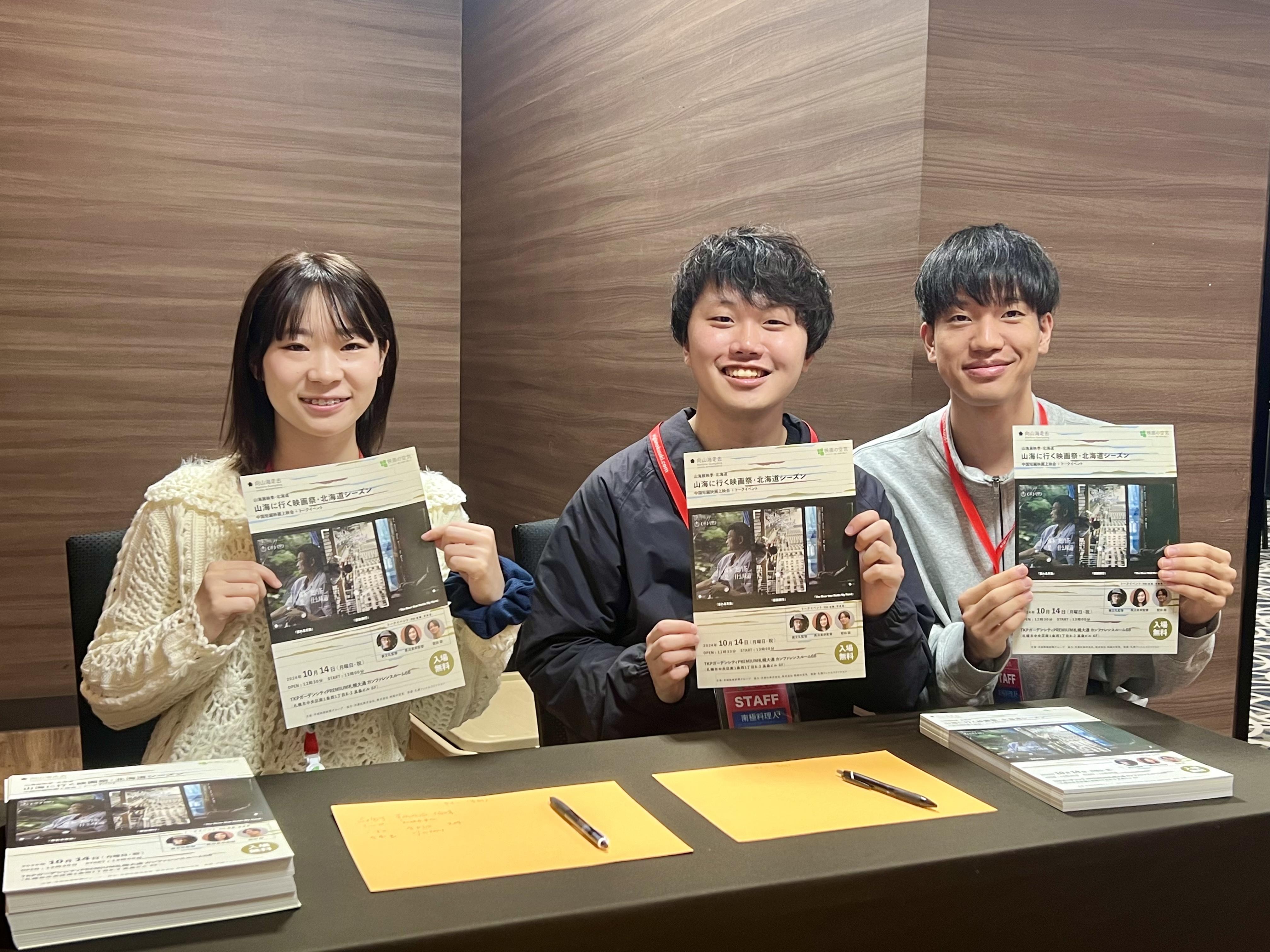
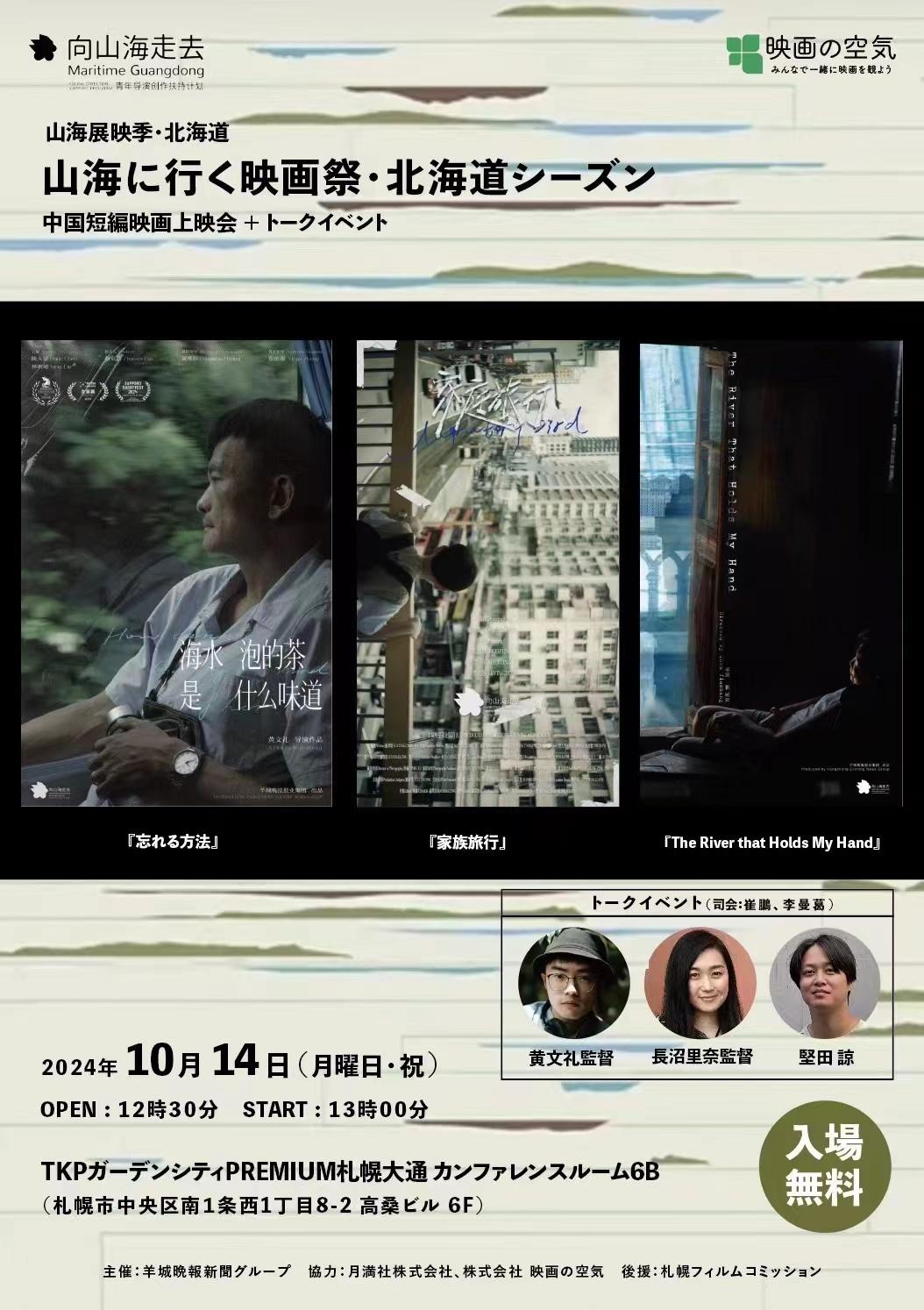
Following its successful screenings in Kuala Lumpur, Malaysia, In 2023, the Maritime Guangdong Program short films have once again gone abroad. On this occasion, Many Japanese filmmakers, cultural scholars, and film enthusiasts attended the screenings, engaging in direct dialogue with the young directors. The discussions extended beyond cinema, touching on the different creative environments of Chinese and Japanese directors and the shared cultural resonance between Chinese and Japanese youth.
This event is organized by Yangcheng Evening News Group, supported by the Sapporo Film Commission (SFC), with academic backing from the Graduate School of Humanities and Human Sciences at Hokkaido University. KOO-KI Co., Ltd. And Tsukimansha Holdings Co., Ltd. Are co-sponsors of the event. In addition to screening the short films, the Maritime Guangdong Program's organizing committee held discussions with organizations such as the SFC and the Sapporo International Short Film Festival (SFF), exploring opportunities for future cross-border collaborations to promote intercultural exchange through cinema.
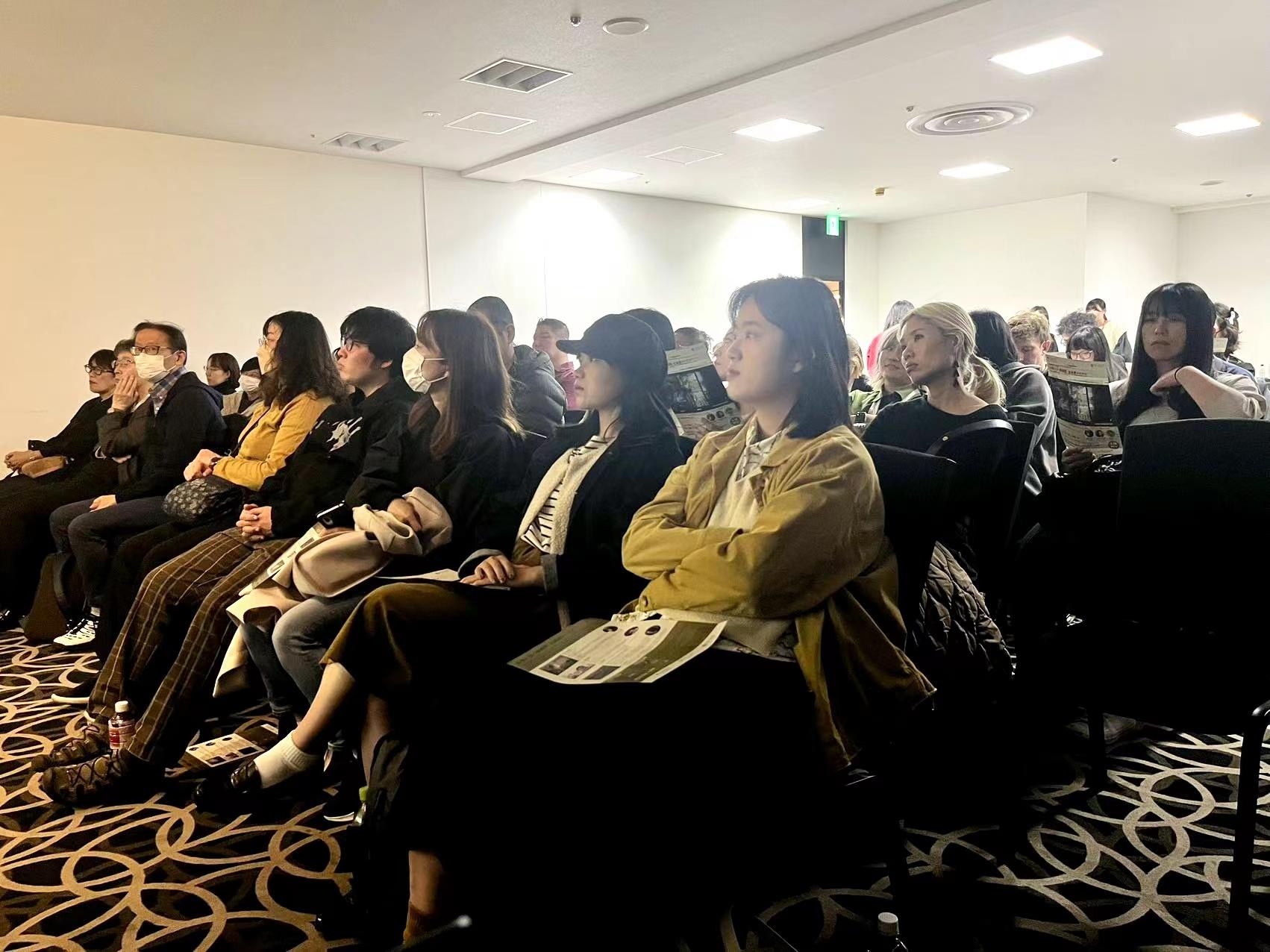
Enthusiastic response at the screening
The 2024 Maritime Guangdong screening season in Hokkaido featured three short films: "Migratory Bird", "How Can I Rid My Mind of Her", and "The River That Holds My Hand". All three works were directed by emerging filmmakers from the Guangdong-Hong Kong-Macao Greater Bay Area, who were selected for the Maritime Guangdong Program in 2023 and supported with funding for their creations. "Migratory Bird", directed by Su Zeliang, tells a family story set in Hong Kong; "The River That Holds My Hand", directed by Chen Jianhang, captures a shared sense of nostalgia between Chaozhou, china, and Ho Chi Minh City, Vietnam; while Huang Wenli's "How Can I Rid My Mind of Her" follows the journey of a Vietnamese returnee working at a tea factory in Qingyuan, Guangdong, as he grapples with personal loss and pain. Notably, "How Can I Rid My Mind of Her" has already been nominated at several domestic and international film festivals, Including the ongoing 19th SFF.
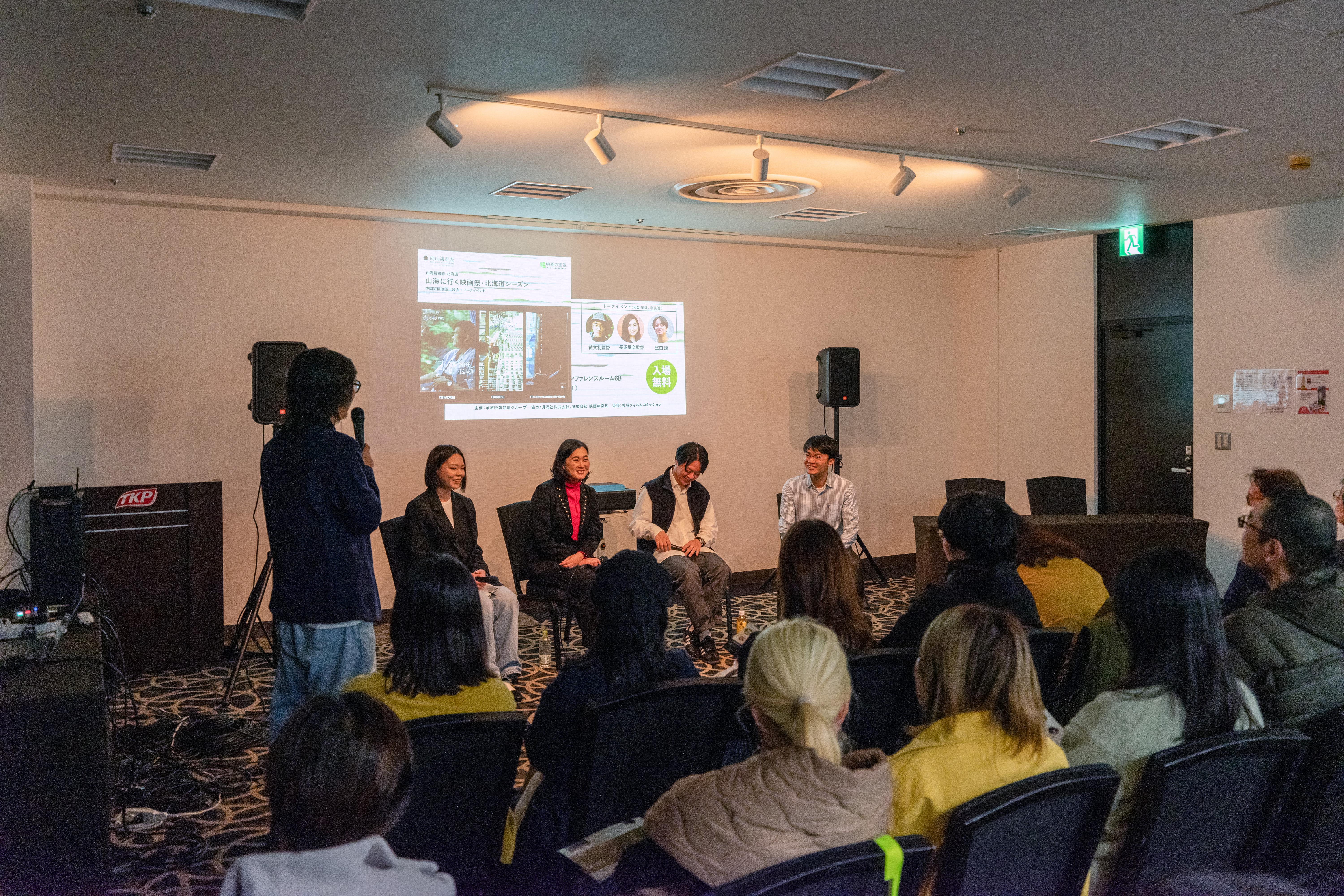
The news that these three Lingnan short films were coming to Sapporo quickly spread across the city, thanks to local media like the Hokkaido Shimbun Press. By the time the event took place, the screening room was packed, with extra chairs needed to accommodate the overflow of viewers. Though the films were shot in Lingnan dialects, the emotions portrayed transcended language barriers, and the thoughtful Japanese subtitles helped the audience fully immerse themselves in the stories. The 90-minute screening flew by, and after it ended, the room was filled with applause, reflecting the audience's deep appreciation for the films.
Huang Wenli, director of "How Can I Rid My Mind of Her", expressed his gratitude on behalf of the young filmmakers for the warm reception. although slightly nervous in front of the international audience, He quickly relaxed as they eagerly raised questions one after another. "What's the special significance of tea in the film?" "Is there a difference in meaning between the Chinese and Japanese titles?" "Why did you combine a story about overseas Chinese with a love story?" huang patiently answered each question, explaining that the film's inspiration came from real-life historical events involving Vietnamese returnees, especially the dramatic scenes of families making their way back to China: "One family took two boats, anticipating the potential dangers of a sea storm. It made me wonder—if the storm had truly come, and one boat sank, How would the remaining family members live the rest of their lives?"
A member of the audience asked about the film's open-ended conclusion: "The man goes to the sea that took his wife—was he there to mourn or to say goodbye?" huang responded: "The ending poses a question. When the tides of history push us forward, do we remain stagnant, or do we try to take a step forward? The man in the film takes his step forward."
Sapporo extends an invitation to Chinese filmmakers
In addition to engaging with the audience, Huang also participated in a roundtable discussion with representatives from Japan's film and academic communities. Japanese director Rina Naganuma, noted film scholar and critic Ryo Kata, and Yuna Haga from the SFC joined Huang to discuss the film industries and creative processes in China and Japan.
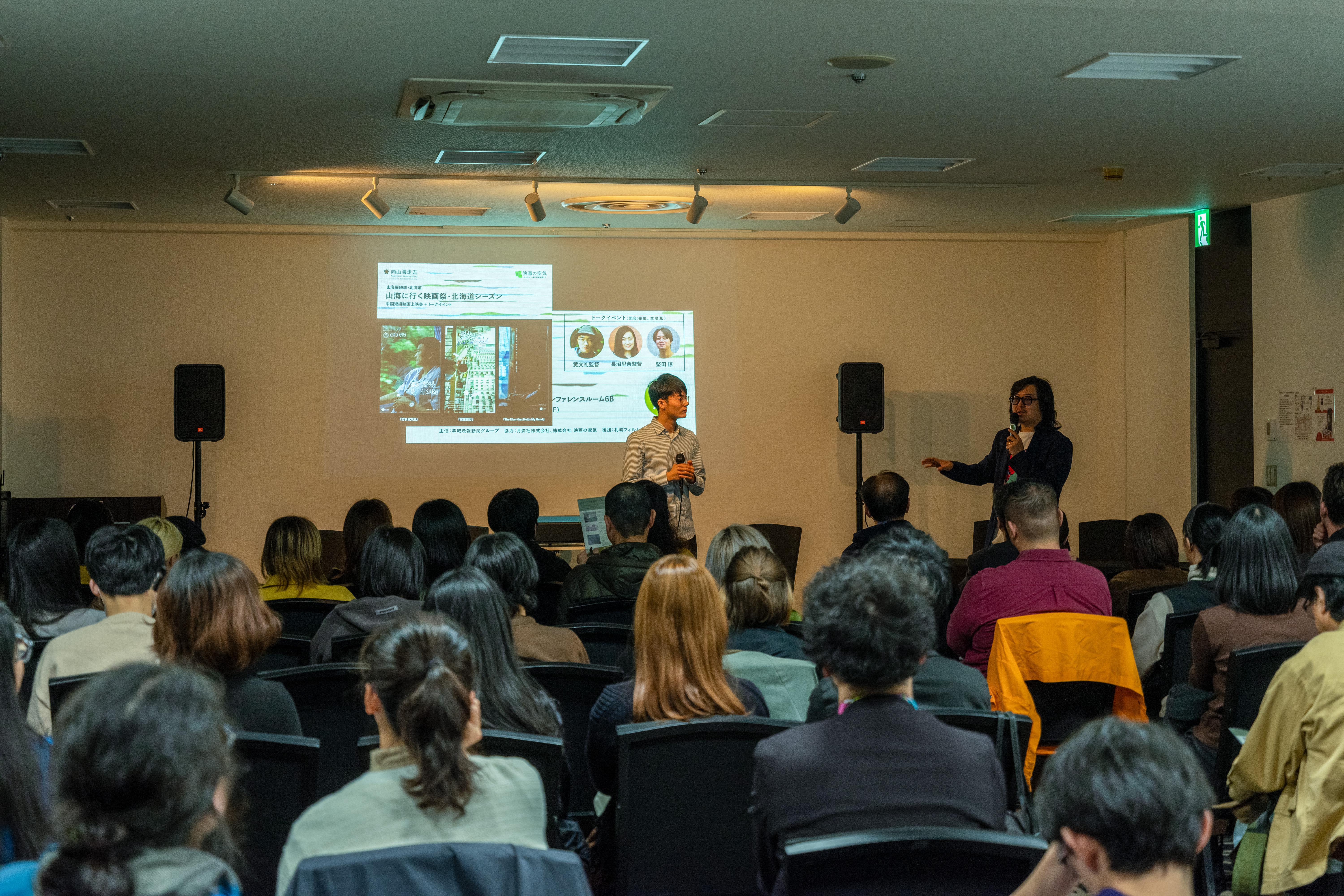
Rina Naganuma, who has worked closely with young filmmakers from Hong Kong and Macao in the past, was impressed by the "quiet" style and mature use of long takes in the three short films. Ryo Kata praised the film "How Can I Rid My Mind of Her" for its excellent audiovisual language, stating, "It not only captures the essence of Lingnan visually, but its sound design also sparks rich oceanic imagery of China."
During the discussion, Huang shared his concerns as a new director: "Do you think my film is too slow-paced? Is there really a market for films like this?" Rina Naganuma confidently replied: "I didn't find it boring at all. On the contrary, It moved me deeply." she even compared Huang's style to that of Chinese director Bi Gan, whose films have gained significant popularity in Japan in recent years. Ryo Kata smiled and gestured to the packed audience: "Just look at the crowd here—that's your answer. If you ever make a feature film, I'd love to be one of your first viewers."
Yuna Haga from the SFC inquired about the various shooting locations in the film and whether there were any challenges during production. Huang credited the support of Yangcheng Evening News Group, saying, "Thanks to their help—not only with funding but also with logistics like locations—we were able to overcome many hurdles."
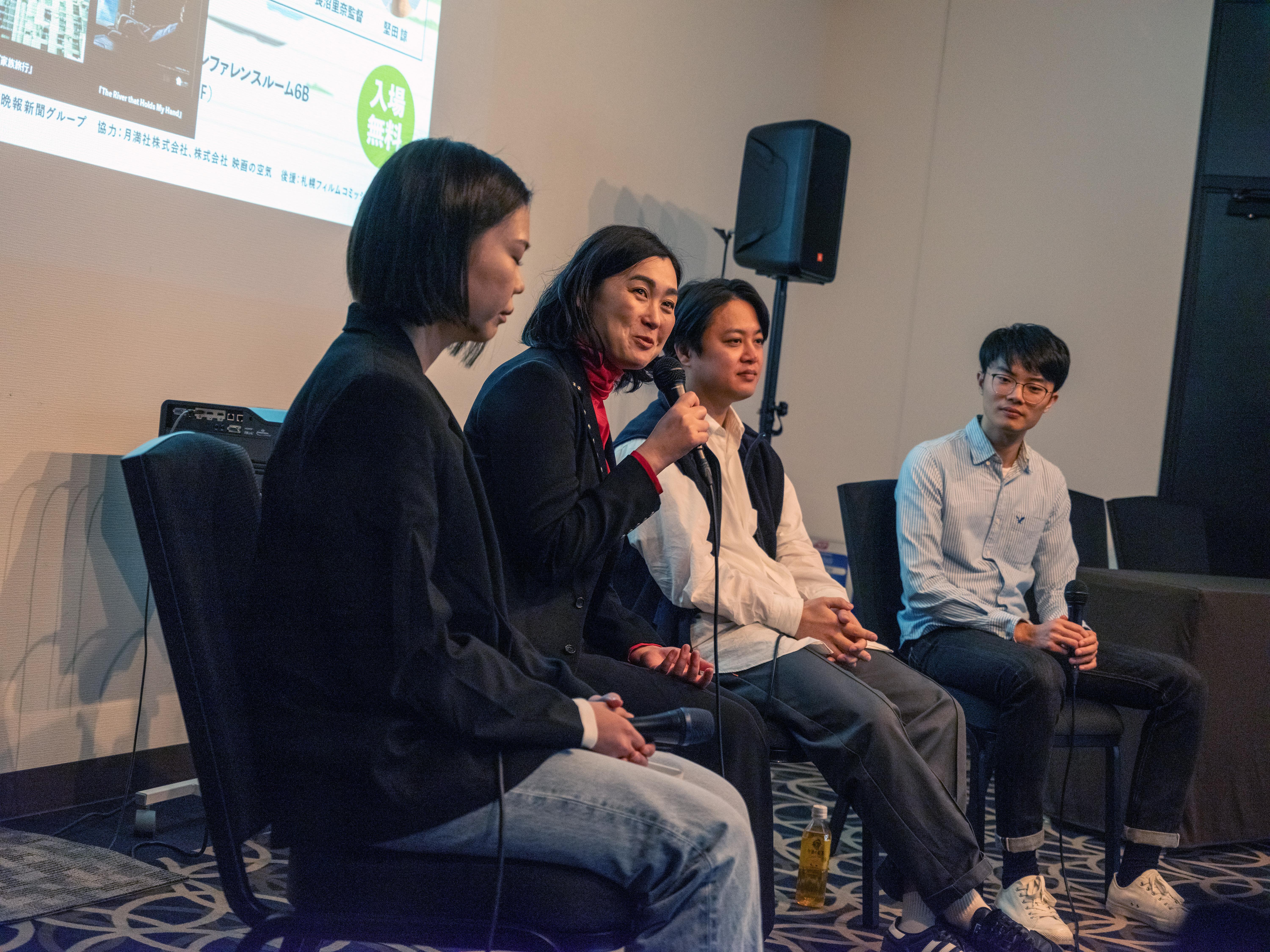
Yuna Haga then extended an invitation through Yangcheng Evening News to Chinese filmmakers, encouraging them to come to Sapporo for future projects. She highlighted the city's film incentive policies: "For films with at least seven days of shooting in Sapporo, the SFC can offer a subsidy of up to 10 million yen."
Lingnan culture captivates Japanese audiences
Discussing the career paths of young filmmakers in China and Japan, rina Naganuma expressed admiration for the formal education many Chinese filmmakers receive. She noted: "I grew up learning on set after high school. In fact, Many Japanese filmmakers never went to college. after watching these three Maritime Guangdong Program short films, I'm struck by how polished the techniques of China's young directors are!I wonder how far Japan's young filmmakers could go if they had the same professional training."
Naganuma also commented that the films offered a refreshing view of Chinese mainland cinema: "Previously, our impression of Chinese mainland films was mostly of big-budget productions. This time, we saw something completely different, and it felt incredibly fresh." she encouraged the young directors to stay true to their style, citing how filmmakers like Takeshi Kitano and Hirokazu Koreeda have achieved success with "quiet" films on the global stage while maintaining solid domestic box office returns.
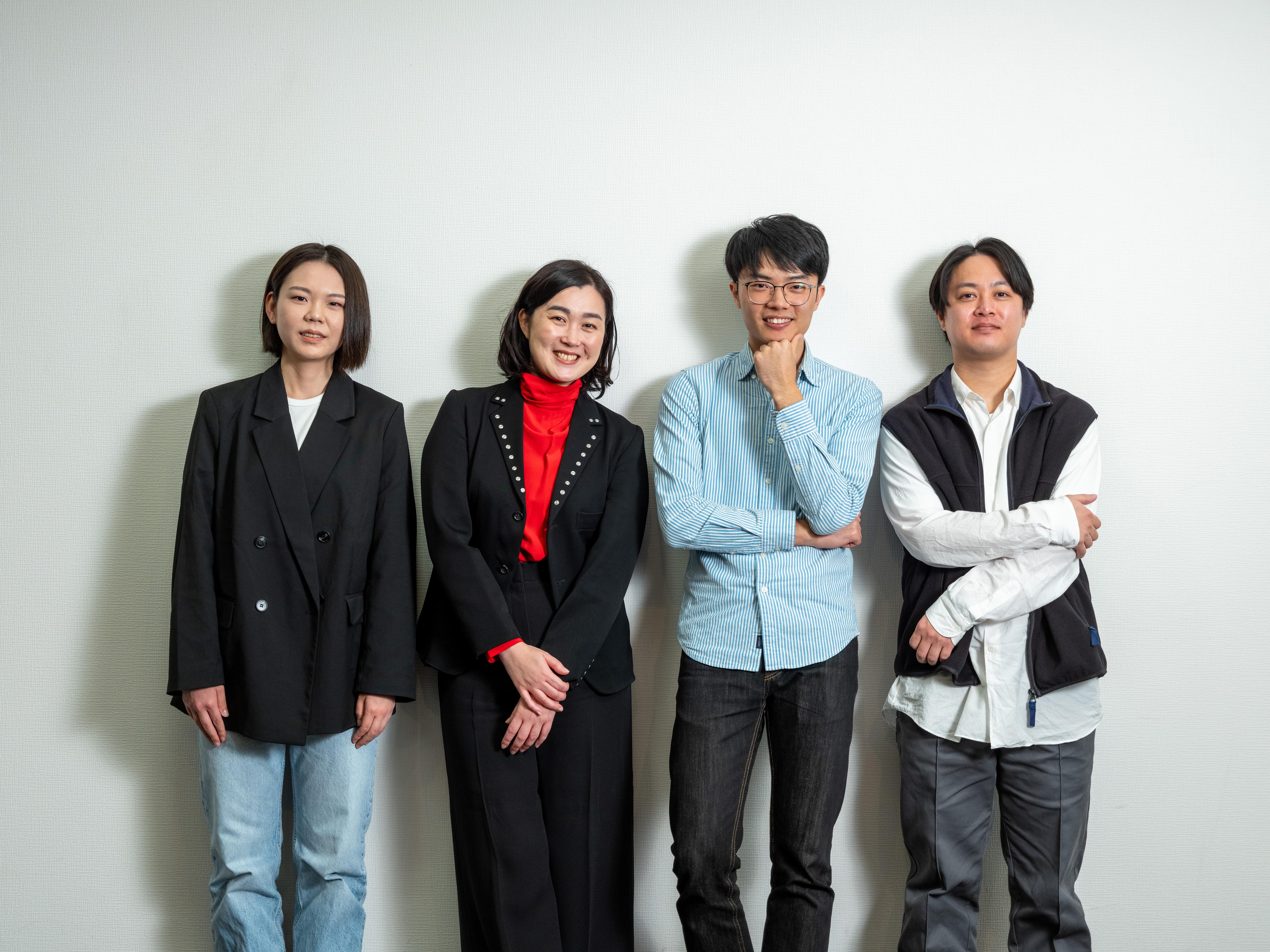
Ryo Kata shared a similar sentiment, saying: "Rather than focusing on differences, I see more similarities between young filmmakers in both countries. Before they become famous, they often work with limited budgets, Leading them to explore personal themes like love and family." however, He was especially captivated by the unique charm of Lingnan culture portrayed in the Maritime Guangdong Program films, stating, "The architecture in southern China is something I've never seen before. China's vast and diverse landscapes allow for a wide variety of cinematic expressions."
Naganuma echoed his thoughts, noting, "Japan is an island nation with a smaller geographic area, so our culture isn't as diverse as China's." she also mentioned that the overseas Chinese culture depicted in the films was new to her and praised the rich sense of history in the works: "While Japanese filmmakers often focus on the present, chinese directors frequently draw from historical contexts, which I find deeply moving."
About the Maritime Guangdong Program
The Maritime Guangdong Program, organized by Yangcheng Evening News Group, Is a major talent initiative aimed at discovering, nurturing, and supporting outstanding young Chinese directors worldwide. Centered in the Guangdong-Hong Kong-Macao Greater Bay Area, the program seeks emerging voices in film creation, offering support for short films across various genres, Including narrative, documentary, and animation. Through this program, young filmmakers are encouraged to push the boundaries of Chinese cinema and present the world with new perspectives on Chinese stories.
山海计划短片首次“出海”日本 岭南风情打动观众
“很难得能看到中国新一代导演的作品!”“刷新了对中国电影的印象。”“再次感叹中国地域的广阔和文化的多元。”10月14日,由羊城晚报报业集团主办的“向山海走去”青年导演创作扶持计划(以下简称山海计划)在日本北海道札幌开启2024年度山海展映季首站活动,观影后日本观众如是表达自己的心情。
这是继2023年度山海放映季奔赴马来西亚吉隆坡之后,山海计划短片再次“出海”。当天,众多日本电影人、文化学者和影迷前来观影,并与山海计划青年导演面对面交流。从中日导演的不同创作生态,到中日青年的文化共鸣共振,话题的范畴逐渐超越了电影本身。
山海展映季北海道活动由羊城晚报报业集团主办,札幌电影委员会支持,北海道大学大学院文学研究院提供学术支持,电影空气株式会社、月满社株式会社协办。除了为日本观众带去山海计划短片,山海计划组委会还将和札幌电影委员会、札幌国际短片电影节组委会等机构接洽座谈,探讨未来加深跨国合作的可能性,以电影之力促进跨文化交流。
放映现场反响热烈
2024年度山海展映季北海道活动为日本观众带去的三部短片是《家庭旅行》《海水泡的茶是什么味道》《The River That Holds My Hand》。三部作品均由粤港澳大湾区新生代导演执导,他们于2023年入选山海计划并获得扶持金用以创作。青年导演苏泽朗的《家庭旅行》讲述发生在其家乡香港的家庭故事,陈坚杭的《The River That Holds My Hand》试图在中国潮州和越南胡志明市捕捉同一缕乡愁,黄文礼的《海水泡的茶是什么味道》则讲述在广东清远茶厂工作的越南归侨男子如何面对人生的伤痛与失去。其中,《海水泡的茶是什么味道》曾入围多个国内外电影节展,包括正在举办的第19届札幌国际短片电影节。
三部来自中国岭南的短片要来札幌了!活动开始前一周,山海展映季的消息便随着北海道新闻等当地媒体的传播在当地传开。活动当天,人们很快就坐满了放映厅,工作人员不得不临时“借”椅子以应对更多观众的到来。三部短片均用岭南方言拍摄,但超越语言的情感加上贴心的日文字幕让观众很快便沉浸其中,一个半小时的观影时光转瞬即逝。放映结束后,满场观众用长久的热烈掌声表达对作品的喜爱。
《海水泡的茶是什么味道》导演黄文礼,代表山海计划的青年导演们感谢观众的到来。他面对海外观众时的稍许紧张,很快便被台下观众一个接一个的热情提问打破。“茶在电影里的特殊意义是什么?”“电影的中文名和日文名有什么不同涵义吗?”“为何将华侨故事和爱情故事融合在一起?”观众都想知道更多电影背后的创作故事。黄文礼一一坦诚作答。他告诉观众,故事的灵感来自越南归侨的真实历史,尤其是他们当年辗转回国的场景:“一家人乘坐两条船,以应对海上可能发生的风暴。这让我不由想象,假如风暴真的降临,一条船带着半个家庭沉没,被留下的人会度过怎样的后半生?”有观众与他探讨影片的开放式结尾:男子去看曾经吞没他妻子的大海,到底是缅怀,还是告别?黄文礼的回答是:“这个结尾是一个提问,当时代的洪流在推着我们前进,我们是裹足不前,还是试着往前走一步?电影里的男子,走出了属于他的那一步。”
札幌向中国导演发出邀请
除了与观众交流,黄文礼这天还代表山海计划青年导演,与日本电影界和学界的代表对谈。日本青年导演长沼里奈、知名电影学者和电影评论家坚田谅、札幌电影委员会代表芳贺优菜,与黄文礼一道,围绕中日电影产业与创作展开探讨。
长沼里奈过去曾与中国香港和中国澳门的青年创作者们联系紧密,这是她第一次接触来自中国内地的青年导演作品。她表示,三部作品的“安静”风格以及对长镜头的成熟运用,都给她留下了深刻的印象。坚田谅则着重指出《海水泡的茶是什么味道》中视听语言的优秀,“不仅从视觉上传达了中国岭南的风情,声音设计方面也非常巧妙,激发了关于中国的海洋想象”。
交流中,黄文礼坦诚表达了自己作为一名新导演的困惑:“你们会觉得我的片子沉闷无聊吗?像这类片子真的会有市场吗?”长沼里奈果断回答:“我不觉得无聊,相反,我的心灵受到很大的震动。”她还说,黄文礼的风格让她联想到了中国青年导演毕赣的作品,“他近年来在日本市场可是颇受欢迎”。坚田谅则笑着指着台下:“看这满场的观众,你就知道答案了。如果以后你拍了长片,我很愿意成为第一批观众。”
札幌电影委员会代表芳贺优菜向黄文礼了解影片取景的经过。她问道:“我发现影片中有很多不同的场景,在取景时遇到过场地方面的难题吗?”黄文礼回答:“感谢出品方羊城晚报报业集团的支持——除了创作扶持金,我们在包括场地在内的很多方面都得到了很大的帮助。”
芳贺优菜表示,她想通过羊城晚报向中国的电影创作者们发出邀约,请大家多到札幌来拍片。她介绍当地的电影优惠政策:“电影只要在札幌有7天以上的拍摄行程,札幌电影委员会就能给予最高1000万日元的补助金。”
岭南风情打动日本观众
谈及中日青年电影人的成长轨迹,长沼里奈对中国青年电影人多受过良好的电影专业教育表示羡慕。她透露:“我是高中毕业后,在片场的实践中成长起来的。事实上,很多日本青年电影人都没上过大学。当我看完三部山海计划短片后,很大的感受是中国的青年导演的电影手法太成熟了!我不禁想,如果日本的青年导演们也接受过相同的专业教育,他们的作品或许能更上一层楼。”
长沼里奈还表示,山海计划短片刷新了她对中国内地电影的看法:“过去,我们对来自中国内地的电影,印象多是那些大制作的片子。但这次,我们看到了完全不一样的东西,感觉非常新鲜。”她鼓励山海计划的青年导演们坚持自己的风格,“在日本,北野武和是枝裕和等导演都拍过‘平静’的电影,在国际上取得了名次,也在国内获得了不错的上座率”。
对中日的青年创作者,坚田谅的看法是:“与其说不同,我更多感受到他们的相同之处。在成名之前,他们都没有太多的预算,因此多半会选择自己感受最深的题材进行创作,比如爱情和家庭。”尽管题材相似,但坚田谅还是被三部山海计划短片中的岭南风情深深打动,“像中国南方的建筑物,那是从没去过中国的我从未见过的”。他说:“中国太大了,每个地方的风貌都如此不同,这能让中国的电影创作呈现出非常多元的姿态。”
长沼里奈也发出了相似的感叹:“日本是一个岛国,地理面积没有中国那么大,因此文化也没有中国那么多元。”她透露,像本次山海展映季作品所带去的华侨文化,对她来说也是第一次深入接触。她被中国青年导演们作品中展现的历史厚重感所打动,“日本的青年创作者更关注身边的事,不太喜欢回忆或反思,但中国的导演很多都会从历史的脉络中寻找当下,这点让我很感动”。
关于山海计划
山海计划是由羊城晚报报业集团主办的对海内外优秀华人青年导演进行挖掘、孵化、选拔和培养的大型人才扶持活动。活动立足粤港澳大湾区,面向全球寻找影像创作领域的新锐力量,支持他们探索剧情、纪录、动画等不同类型的短片创作,突破和展开对未来华语影像文化的想象之路,也让世界通过影像重新发现中国。
出品人 | 任天阳、林海利
总监制 | 孙璇、胡泉、林如敏
总策划 | 孙朝方
执行总监 | 吕楠芳
活动统筹 | 蔡淳淳
传播统筹 | 李丽、詹锡伟
文 | 李丽
译 | 赵凡
审 | 邹晓华
-
The 14th China International Animation Copyright Fair to kick off in Dongguan with over 1,500 IPs
2024-10-15 23:47:25 -
Guangdong aims to achieve RMB 300b in commercial space and related industries by 2026
2024-10-15 23:47:25 -
New global digital trade landscape in Canton Fair: SMEs as the main force in overseas development
2024-10-15 23:47:25 -
Y Talk 83| The star of the Canton Fair: innovation 广交会的“C位”是谁?创新
2024-10-15 23:45:59






